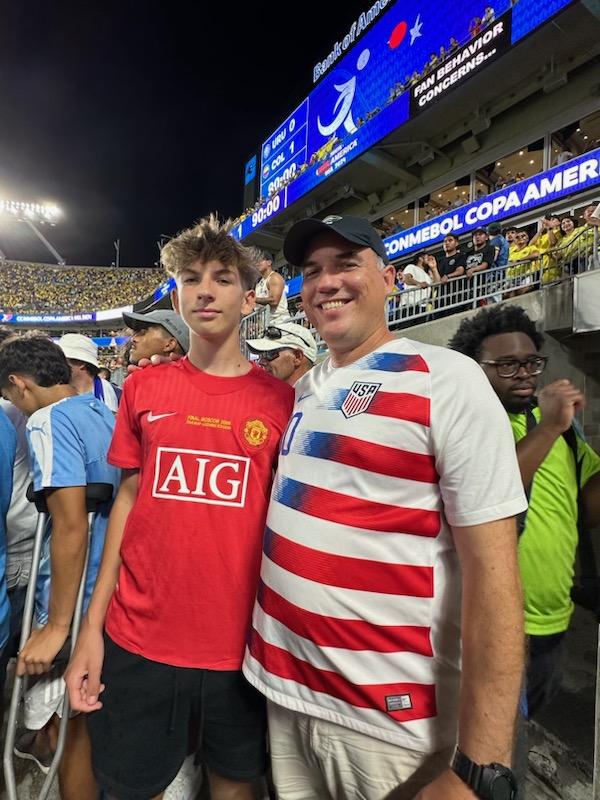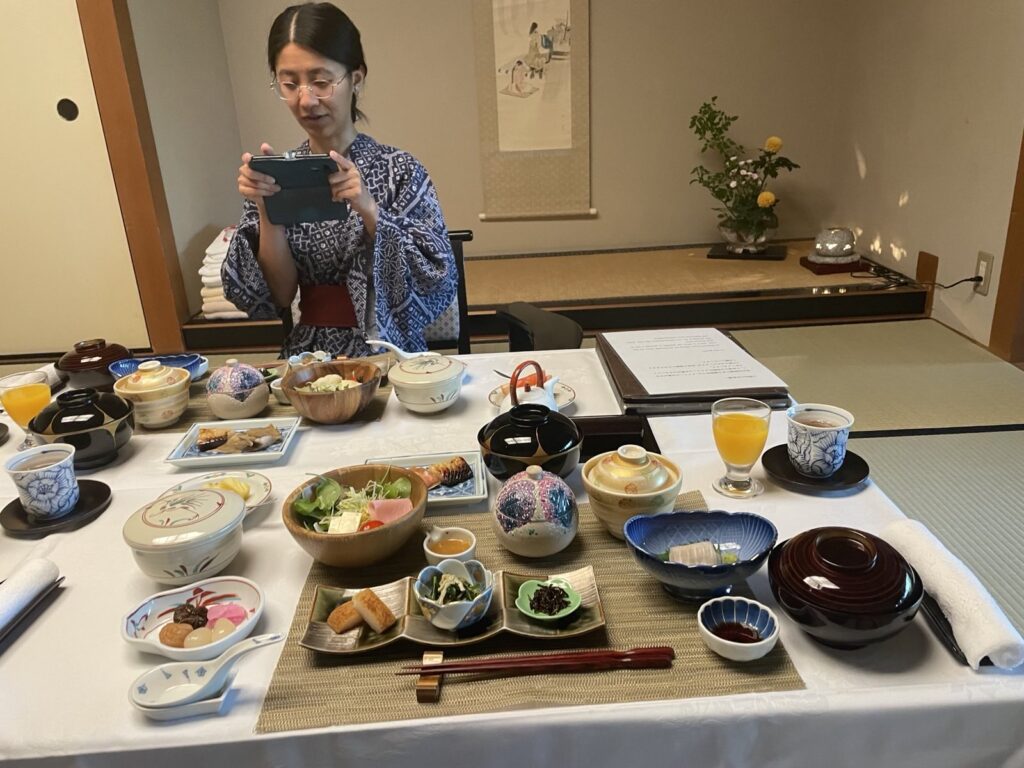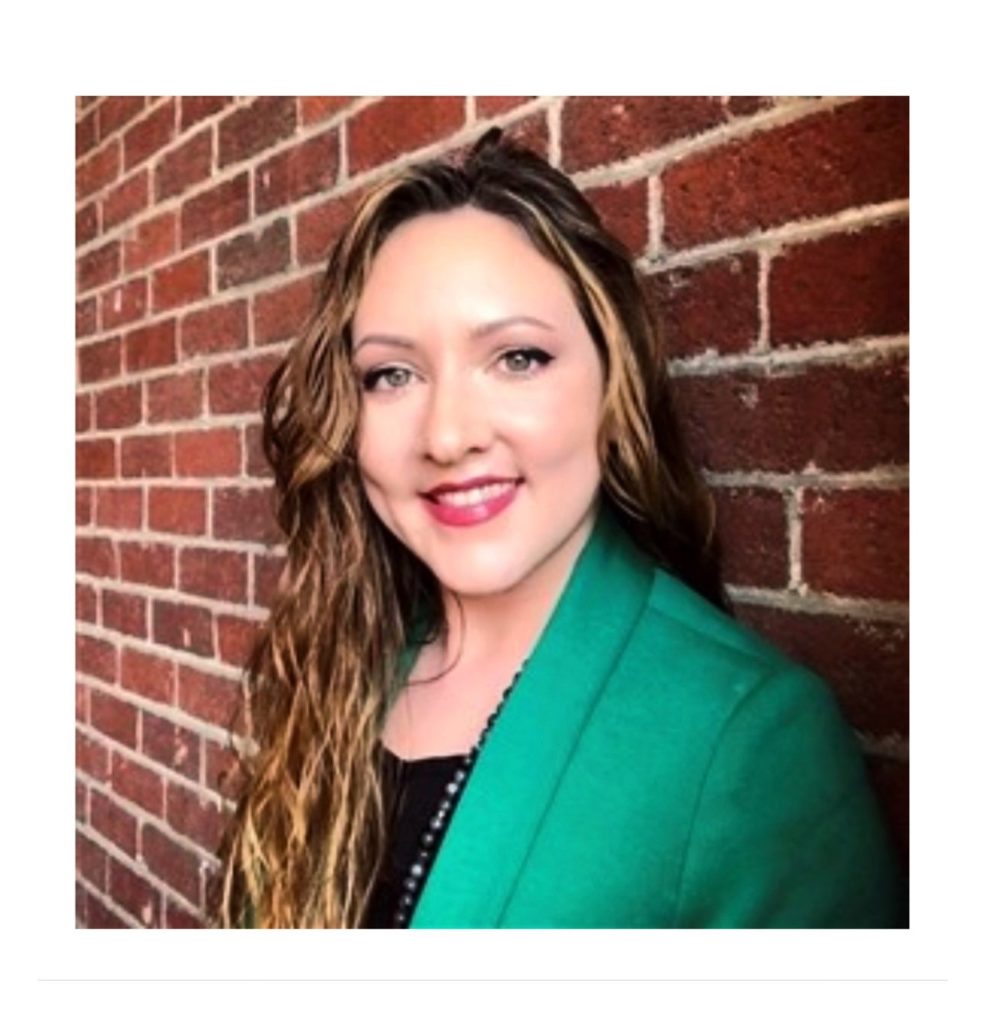As we dive into the new academic year, we thought it would be fun to share some highlights from the summer adventures of our psychology faculty members. From personal milestones to family escapades, our professors had a variety of experiences that added a splash of excitement to their summer breaks. Let’s take a closer look…
Dr. Nichols’ Family Travels and Favorite Reads


This summer, Dr. Nichols and his family embarked on two major trips. The first was to Charlotte, NC, for the semifinal of the Copa America. The second was to Sarasota, FL, where they helped move his eldest daughter, Kennerly. The trip also included some relaxing time at the beach, as pictured above!
Dr. Nichols also found time to revisit one of his favorite book series: Harry Potter. He’s reading through the entire series for the third time, this time with his youngest child, Jacob. Years ago, he read the books with each of his older children, and even with his wife while in graduate school.
Dr. Findley-Van Nostrand’s Program Development and Hufflepuff Pride
Dr. Findley-Van Nostrand’s summer was packed with exciting work. She’s leading the development of a psychology master’s program, a project funded by the Dean’s office. Along with others, she’s working on various components of the program and hopes to submit it for curriculum approval this semester.
She also made headway with her research. She currently has two studies under review and another in preparation. One focuses on young adults’ relational aggression, particularly how their status striving and insecurity impact it. The other two studies examine adolescents, exploring racial differences in various forms of victimization (physical, relational, verbal, electronic) and how these relate to self-esteem and depression.
For fun, Dr. Findley-Van Nostrand and her family spent time traveling, with the highlight being a couple of weeks in Tampa and Orlando visiting friends and family. They also enjoyed a visit to Universal Studios, where she and her son celebrated their shared Hufflepuff pride!
Dr. Buchholz’s Camping and Canoeing


Dr. Buchholz’s summer highlight was an unforgettable six-day, 45-mile camping canoe trip down the James River with his son and his son’s best friend. The adventure was surely magical, and something Dr. Buchholz will cherish forever.
Dr. Bu’s Japanese Adventure

Dr. Bu’s summer highlight was a trip to Japan right after the academic year ended in May. Among the many memorable experiences, staying at a traditional ryokan in Hakone (a spa town outside Tokyo) stood out. The meals, including the breakfast shown in the picture, were exceptional and left a lasting impression. Dr. Bu is already looking for excuses to return to Japan!
Dr. Allen’s Milestone and Memories
This summer, Dr. Allen had a significant personal milestone: receiving a cochlear implant in July! While the process of adjustment is ongoing, Dr. Allen is already hearing much better and is happy to share insights and answer any questions from any students curious about the experience.
Dr. Allen’s favorite memory was a nostalgic visit to Chapel Hill, NC. It was a delightful reunion with a friend from graduate school, filled with reminiscing and laughter. As Dr. Allen puts it, “We may look like respectable middle-aged women with husbands and children, but stories were told.”
Dr. Kennedy-Metz’s Research Achievements and Home Projects
Over the summer, Dr. Kennedy-Metz had a rewarding season with the acceptance and publication of two significant manuscripts she worked on with her research group in Boston from her time at Harvard Medical School. The first, Deep Learning Analysis of Surgical Video Recordings to Assess Nontechnical Skills, is now available in JAMA Network Open. The second, A Novel Multimodal, Intraoperative Cognitive Workload Assessment of Cardiac Surgery Team Members, is in press with the Journal of Thoracic and Cardiovascular Surgery.
Additionally, Dr. Kennedy-Metz had the chance to be a guest on the podcast “Heart Rate Variability,” though it’s not yet released.
In a different realm, her, her husband Josh, and her mom, undertook a major home project, painting six rooms in just three days—what an endeavor!
Prof. McCutcheon’s Program Development and Puppy Joy


Prof. McCutcheon had a productive summer preparing for the launch of Roanoke’s new Disability Studies program, which is set to be an exciting addition to the Psychology Department.
But it wasn’t all work and no play! Prof. McCutcheon also had a fantastic time introducing her new puppy, Connor, to the joys of water. A memorable outing involved hiking to the Cascades, where Connor had a blast splashing in the creek and swimming. Check out these adorable pictures of Connor enjoying his new aquatic adventure!
Prof. Garcia’s Family Time and New Opportunity
Prof. Garcia’s summer was a whirlwind of family activities, shuttling her daughter to various camps, including tennis, theatre, dance, and soccer. Amidst the busy schedule, the Garcia family managed to sneak in a relaxing beach trip to Emerald Isle, which was a perfect way to unwind.
Her summer wrapped up with exciting news: being offered a visiting position at Roanoke College!
Congratulations, Prof. Garcia, and we are so thrilled to welcome you to the department!
We hope you enjoyed this glimpse into the summer adventures of our psychology professors. Their diverse experiences and personal milestones remind us all of the richness of life outside the classroom. Here’s to a new academic year filled with continued learning and growth!
Feel free to reach out to any of our professors if you have questions about their summer adventures or any of their exciting projects.
Get Connected!
Blog: https://psych.pages.roanoke.edu/
Facebook: https://www.facebook.com/rcpsychology
Linked In: https://www.linkedin.com/groups/RC-Psychology-8140491/about
Website: http://www.roanoke.edu/inside/a-z_index/psychology
Instagram: rcpsychology


